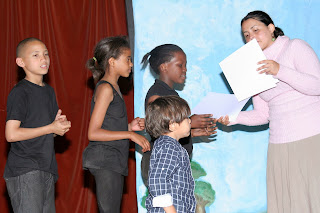Although
I do not fully agree with all the arguments raised by Roxanne Henderson
and Nic Spaull below, I do agree that the Quintile System is not fair,
especially to those poor schools that fall in Quintiles 4 and 5.
Quintile system perpetuates school inequality‚ Equal Education says
Schools in quintiles one to three receive more in government funds and often do not charge fees. File photo
The privatisation of education must fall so that the money of South Africa's rich can filter through to poorer schools‚ advocacy organisation Equal Education (EE) has said.
Speaking at its Teaching and Learning Summit on Friday‚ EE secretary-general Tsepho Motsepe said that no public money should be spent on private schools.“The Public Investment Corporation (PIC)‚ and any other public entity that has invested in any private schooling entity‚ should immediately withdraw such an investment‚” he said.“Profit-driven individuals or donors” should also refrain from pumping money into these already wealthy schools‚ Motsepe said.
The number of private schools in SA are on the rise‚ which Equal Education condemns.
Motsepe also said that the quintile system currently employed in SA's schools must be abolished.
The quintile system places schools into quintiles one to five‚ and subsidises them accordingly.
Schools in quintiles one to three receive more in government funds and often do not charge fees.
But‚ according to Motsepe‚ this system has perpetuated inequality in the schooling system‚ with wealthier schools in quintiles four to five attracting better teachers.
Traditionally‚ these schools are able to employ more teachers and offer them better salaries.
A new model is needed where middle-class parents paying school fees at top schools subsidise poor schools instead.
“We have a responsibility to the poor. The poor continue to access poor schools and are affected with youth unemployment‚” Motsepe said.
Education in SA – Still separate and unequal
Nic Spaull, an education researcher
in the Economics Department at Stellenbosch University, has the folowing to say:
When allocating funding to schools, the Department classifies them into one of five categories called quintiles. Each quintile is meant to have 20% of schools ranging from Quintile 1 (the poorest 20% of schools) all the way up to Quintile 5 (the richest 20% of schools). The funding allocations are pro-poor with Quintile 1 schools receiving R905 per learner and higher quintiles receiving progressively less funding all the way up to Quintile 5 schools which receive R156 per learner.
(Nic blogs about education research at www.nicspaull.com and he can be followed on Twitter @NicSpaull.)








